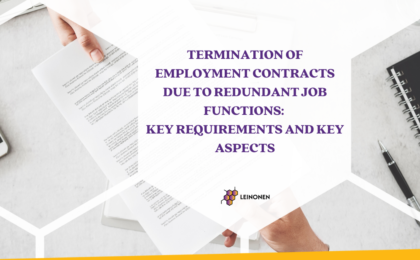In order to implement the provisions of Directive (EU) 2018/957, from 30 July 2020 the amendments of Articles 108 and 109 of the Labour Code enters into force. These changes are relevant to foreign employers (both inside and outside the EU) posting workers to Lithuania. The purpose of these amendments is to unify the working conditions of employees working in the countries and those being posted to it.
Business trip is the performance of job duties in a place other than where the permanent workplace is located. The Labour Code amendments will apply to posted workers who will come to Lithuania:
– on the basis of contract concluded for the performance of works or the provision of services;
– to work in a branch, representative office or subdivision of employer located in Lithuania;
– as temporary employees.
Please note that when an employee goes on a business trip to another country for the purpose of participating in a conference, training event, etc., the following Labour Code amendments will not apply.
The main Labour Code amendments:
– obligation to ensure that employees posted to Lithuania are paid not the minimum salary, but the usual salary for the profession, provided for in legal acts or in collective agreements at a higher level than the employer. This requirement could be waived (except for temporary staff) in cases where the business trip lasts less than 30 days;
– possibility to include daily allowances in the remuneration, but only if the law applicable to the posted employee’s contract makes it possible to distinguish the daily allowance from the actual travel, accommodation and food costs. If it is not possible to separate the expenses, the daily allowance will not be included in the salary;
– obligation on the employer to provide guarantees in connection with the accommodation of employees, in cases where the accommodation is provided by the employer outside the permanent place of work;
– reimbursement of additional costs incurred when traveling to and from the place of work in Lithuania and when posting employees to Lithuania and abroad (daily allowances, transport, travel and other expenses);
– if the employee’s business trip lasts for more than 12 months, regardless of the law applicable to the employment contract, the posted employee will be subject to all provisions of the Labour Code and other employment laws, collective agreements, with the exception of the provisions on the conclusion, termination and non-compete agreements;
– if the business trip exceeds a period of 12 months, a permit from the State Labour Inspectorate will have to be obtained. The business trip may be extended but it cannot be longer than 18 months.
The new amendments will not apply to drivers of road vehicles, for the carriage of goods and/ or passengers on international routes. These workers will be covered by the “Mobility Package” initiated by the European Commission, a systematic set of amendments to road transport legislation.
At Leinonen we aim to provide up to date information regarding the latest changes and development in the business sphere of Lithuania. We suggest that you follow our LinkedIn page for news, discussions or general communication with us – LinkedIn/Leinonen.
For queries related to payroll, accounting, tax & legal or opening a company in Lithuania – contact a member of our team. We offer high-quality accounting and financial management services, enabling clients to focus on their core business.



